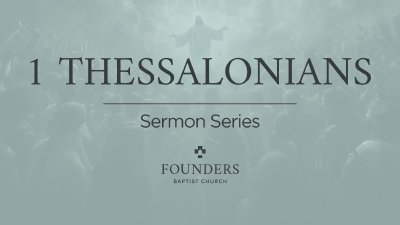Introduction:
Eschatology (the study of last things) has long proven to be a place of disagreement among believers.
It is a category of biblical knowledge that requires charity.
We must not demonize our brothers.
We must engage with each other about these issues graciously.
We must always remember what the MOST important conviction about the end of the age is.
All who believe the Scriptures are looking forward to the visible, bodily, return of Jesus Christ in His glory.
All who believe the Scriptures confess that Jesus will return to the earth just as He left it, but this time in glory — just as the angel of God announced it.
ESV Acts 1:10 And while they were gazing into heaven as he went, behold, two men stood by them in white robes, 11 and said, "Men of Galilee, why do you stand looking into heaven? This Jesus, who was taken up from you into heaven, will come in the same way as you saw him go into heaven."
He will judge the living and the dead — He will fulfill every promise and purpose of God regarding the future — He will make plain that He defeated the great enemy of our souls.
We will spend eternity with Him in the accepting presence of God our Father.
And all of this is explained entirely by the grace of God, accomplished by the all-sufficient saving work of the Lamb of God.
That’s the bare minimum that every Bible believer must embrace. On those things we can have no disagreement.
But if we are to honor the Scriptures, we can’t stop there. We can’t stop there because the Bible gives us more information than just those bare minimum facts.
We can’t just punt when it comes to the subject of eschatology.
We can’t do that because we are going to encounter passages, like the one we come to today, that FORCE US to a position.
So, to be clear, and without apology, the way I approach these passages is from a premillennial position, and from a pre-tribulation rapture position.
And this is the formal position of our church on the subject.
That doesn’t preclude us from loving each other if we differ.
It doesn’t preclude us from serving with each other, respecting and appreciating each other.
Because what we hold in common (we are looking for the return of Jesus) is greater than our differences over the details.
BUT THAT DOESN’T MEAN THE DETAILS DON’T MATTER.
In our verses we meet with a church that was being destabilized due to deception about eschatology.
Someone, or some group of people, had been telling them that the day of the Lord had come.
What this teacher or teachers said was in direct conflict with what Paul had taught them when he was with them, and what he had taught them in his first letter.
What he says in this 2nd chapter required him to revisit the same subject matter he had written about just a few months earlier.
What about the coming of the Lord Jesus, and what about believers being gathered together to Him? (vs.1) — that is the subject matter in our text.
Paul had dealt with the return of Christ for His church in 1 Thessalonians 4, and the day of the Lord in 1 Thessalonians 5.
BUT HERE THEY ARE CONFUSED ALL OVER AGAIN.
And they are confused due to a DECEPTIVE DISSEMINATION OF DOCTRINE. People were disseminating their views but in the name of Paul.
He mildly rebukes them for that, even as he patiently calls for their discernment, and for them to remember what he had already taught them.
HIS APPROACH NOW, AS HE SEEKS TO STABILIZE THEM WITH THE TRUTH, IS REVEALING.
He answers them with truth about THE ANTI-CHRIST.
He tells them that the day of Lord could not have possibly come, because there are events that must take place before the day of the Lord arrives.
The Day of the Lord, as Paul refers to it here, has a kicking off point. There is something that occurs at the beginning of it. The way he describes it is interesting. It consists of two things. It consists of an apostasy and of an anti-Christ, a man of lawlessness. It consists of a movement and a man. Paul mentions the apostasy first, and then he turns to the man. He gives an extended description and explanation concerning the man, and then he ends with more information about the apostasy.





